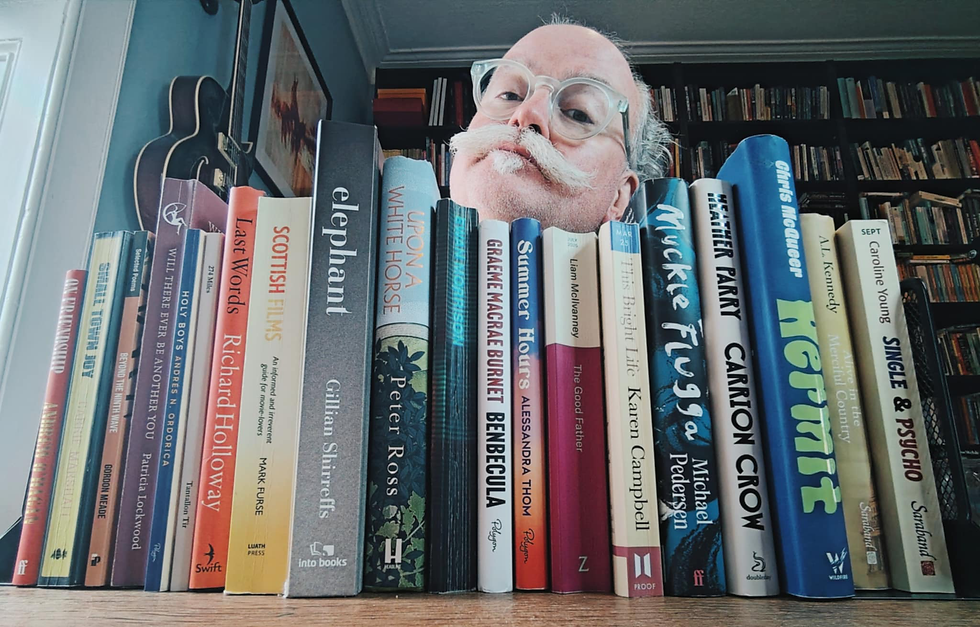East Meets West: A Review of Chiew-Siah Tei’s The Mouse Deer Kingdom…
- Alistair Braidwood

- Mar 17, 2014
- 3 min read
It’s been a while since the last Scots Whay Hae! book review, Nina de la Mer’s Layla to be exact. The reason for that is, donning my editorial hat for Cargo Publishing, my recent book related habits have been dominated by reading, re-reading and reading once more Alasdair Gray’s next book, Of Me And Others. Yes, that’s a plug, but in the last few months that project became all consuming for everyone involved. However, that time is nearly over, and I have a lot of books to catch up with and review, so expect a glut of such on these pages in the near future.
The first is The Mouse Deer Kingdom by Chiew-Siah Tei. I actually started reading it at Christmas time, but soon realised that this was a novel that demanded your undivided attention; you couldn’t dip in and out of it between buying presents and mulling wine. I put it aside and only returned to it again last week.
My initial feelings proved to be correct. Tei demands the reader concentrate fully as she describes a world which is often in flux, with characters being introduced, disappearing, and sometimes reappearing, quite unexpectedly as the narrative unfolds. It’s a beautifully crafted book, one which takes you in one direction, then pulls you in another. You initially think this is going to be the story of Chinese immigrant to Malacca, Chai Mingzhai and the western trader Martin Gray, two men who recognise themselves in each other. As Martin says about Chai, “this was another constricted soul waiting to be liberated”. Initially it is through Martin’s eyes that the inevitable clash of cultures which underpins the novel is most keenly seen as he spends time in the western ‘Club’, drinking, dancing and playing tennis while all the time drawn to the world outside and the people who live there.
Part Two sees a shift in focus onto the character of Engi, a local boy who is taken in by Chai, and his story is told in a first person narrative which adds another layer for the reader to break through. He is a child of nature, one more at home in the forest than in the developing world. Through his eyes we get yet another view of this strange, new, hybrid society, and begin to realise that the law of the jungle may be less cutthroat and dangerous than his latest home. Engi represents the old Malacca, with its folk tales and rituals, and it is his journey as the novel progresses which becomes the most enthralling.
The Mouse Deer Kingdom is a novel about cultural, social and political differences, and you may expect that you will be more familiar with one set rather than another, but that is not necessarily the case. As East meets West, the two are constantly changing to accommodate each other, and that makes for a shifting backdrop that it is difficult to pin down. I kept thinking of E.M. Forster’s A Passage To India as I read, with which Tei’s book shares a sense of unease which is a result of inevitable misunderstandings as often opposing social and cultural values are applied, and denied. Mysterious, sensual, at times erotic, (the humidity and heat are palpable off the page) Tei lends a magical realism to her Malacca which means you are never quite sure of what you read.
The Mouse Deer Kingdom is a sequel of sorts to Tei’s debut novel Little Hut Of Leaping Fishes, but you don’t need to have read the latter to appreciate the former. It is historical fiction, but the history is not so far away as to make it unrecognisable, the idea of a global market being nothing new even in 1905. It is the place rather than the time which lends a distance to the action which the reader has to bridge. It can be a disconcerting destination to spend time at first, but once you become acclimatised you’ll be pleased you stayed with it. You won’t forget your time spent in The Mouse Deer Kingdom, and are left with the desire to stay longer and to know what happens next.









Comments